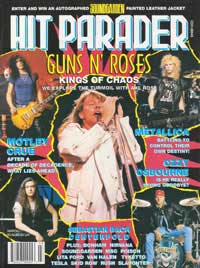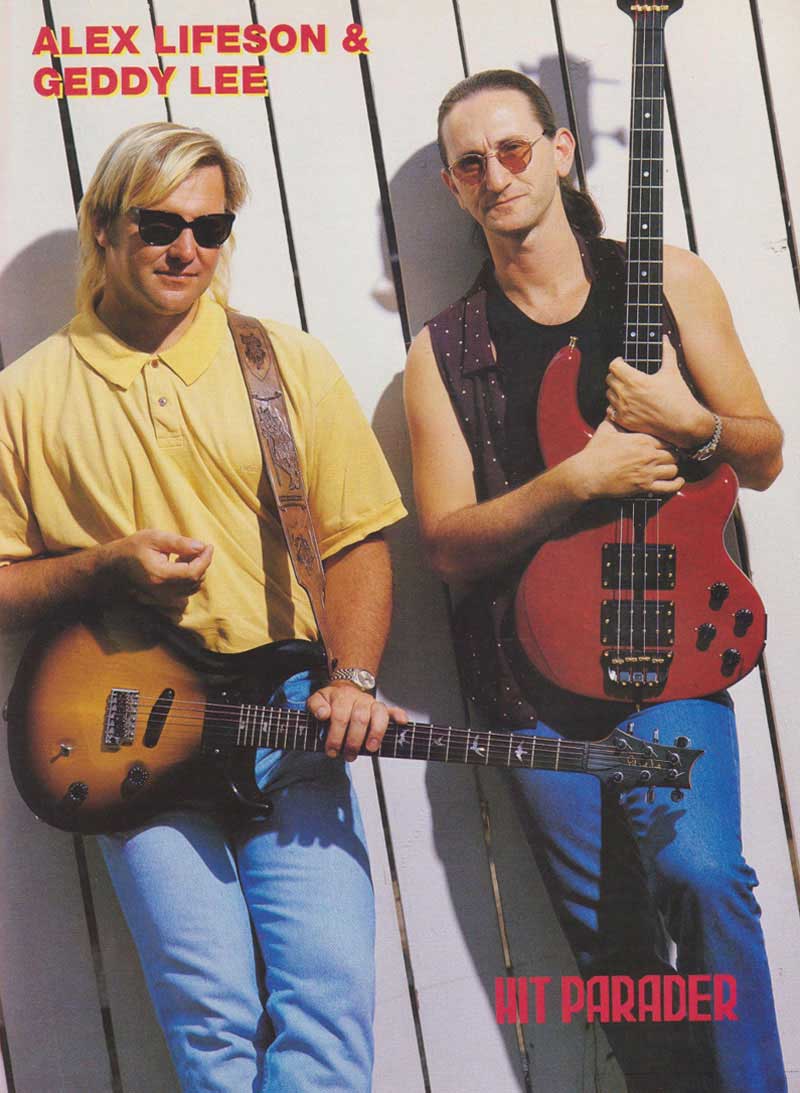Bad To The Bones
Bassist/Vocalist Geddy Lee Tells The Secrets Behind Roll The Bones
By Andy Sechier, Hit Parader, March 1992, transcribed by pwrwindows

For a guy whose cutting vocals rank among the most famous in the hard rock world, Rush's Geddy Lee is surprisingly soft spoken. Granted, when we encountered the razor-thin singer/bassist at his record company's New York headquarters, he had just completed a tiring day of meeting and greeting a seemingly endless series of company executives, radio people and press folk who had managed to turn the Toronto native's day into a virtual talk-a-thon. But despite his hectic schedule, nothing could diminish Lee's buoyant spirit -one that had been enhanced by the chart-topping status of Rush's latest LP, Roll The Bones. Just a mere mention of the album was enough to bring a smile to his face and power to his fading voice.
You haven't allowed yourself to be interviewed that often in the past. Why are you talking to the press this time around?
The truth is that I don't enjoy talking to people. Actually, I don't mind the talk, it's just that when you're scheduled to do a number of interviews with radio or press people one-after-the-other, you begin to sound like a robot, and I hate that. ,I believe that when you've poured a lot of energy into making an album, and you want people to understand how sincerely important the music is to you, you can't afford to not come across as not caring.
Is It difficult for you to discuss Rush's music?
I think you can talk away the magic. Back when I was young, and I was a fan, I wanted to be able to listen to the songs and figure out what they meant to me. I don't like to read reviews of movies, for instance - at least until after I've gone to see the movie. It's the same thing with our music. I don't want people to read what I have to say and then try and figure out whether Roll The Bones is a good album because of that. I'd much rather have them listen to the album, then read what I have to say about it. But I do realize that people are interested in what motivated us and why we made this kind of record, and I'm happy to discuss that.
You talk about not reading movie reviews before you go - but how do you feel about reading Rush reviews?
I'm not that big in that either (laughs). I think that started a few years ago when I read one reviewer who presented the case that Rush was Satanic. That was the most bizarre interpretation of what we're about that I ever read. I remember that (Rush drummer) Nell Peart sent a long letter answering that review, and they printed it. That was great! The reviews that I've seen for this album have been very positive, and I appreciate that, but I must admit that I don't go out of my way to see them, whether they're positive or not.

You've been making records for more than 15 years, do you still take the occasional negative review or "Satanic" accuser seriously?
You do reach a point where you don't take criticism - good or bad - that seriously. You develop a sense where you know what to take seriously, and what to ignore. Occasionally there is a review that does open your eyes and makes you aware of something you've done that you weren't even aware of. But most of the time I try to ignore the reviews that are too good or too bad - I guess I just read the mediocre reviews.
How would you compare Roll The Bones to some of Rush's other recent albums?
I think this one has more focused energy. By that I mean the sound is slightly more direct and streamlined. I believe we were more successful in attaining the style we wanted on Roll The Bones than we were on Its predecessor, Presto. There's an optimism on this record that reflects the good time we had making it. We were happier as members of this band this time than we've been In awhile. I remember at the end of the Hold Your Fire tour, we had a very negative feeling around the band. I was sick, and the tour hadn't gone that well. With Presto, things began to get back on track, and now we've developed a good balance between our work lives and our private lives. That's important to us.
Do you feel the need to spend more and more time away from the road as you get older?
Oh sure. When you have a family, you just can't go on the road for six months or longer like you could a decade ago. Also, you don't enjoy yourself as much working that way. We need time off to enjoy what we've worked so hard to attain over the years. The Presto tour was a test case for us in that we took more days off and tried to make It a more useful part of our lives. We went home for a week after three weeks on the road, and we learned that operating in that manner was good for us. That really set us up for Roll The Bones. We felt we had discovered the humane way of working in Rush.
What new song best reflects the attitude of Rush in late 1991?
That's a hard question because I really do like all the songs, but if I have to pick one I guess it would be "Bravado". It's one of those songs where the writing of it came in an almost spontaneous manner. We found ourselves on the emotional side of things right away and those feelings just poured out of us. When things come out of you naturally, it's a very magical experience. But I think the emotions and music on "Bravado" really do capture what Rush is about at this time.
On the other hand, what was the most difficult part of making the album?
"You Bet Your Life" was a very difficult song because the choruses are so dense. It was almost impossible to mix. We had recorded so many parts that when it became time to mix we had to wade through a lot of stuff just to find the song that we knew was in there.
Rush is a band that depends on studio technology to attain the sound you want. How much different is it for you to get the sounds you want today as compared with an album like 2112?
It's unquestionably easier today, both from the fact that studio technology has improved and from the point of view that we've become more focused as musicians. We went through a period when we indulged every device known to man, but we've simplified things in recent years. For this album one of the technicians was bringing in so much stuff that I suddenly looked at all of it and said, "Hey, give me my bass, I just want to play." It was kind of a return to basics for us. As far as how this album sounds as compared to earlier ones, that's hard to say. There are some early things that we did that make me cringe when I hear them. Others, like parts of 2112, hold up well. But I think we've never sounded, or felt better about an album, than we do right now - and we're proud of that.